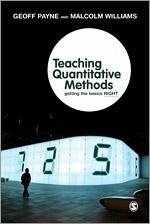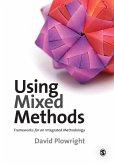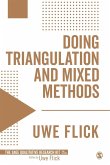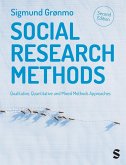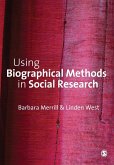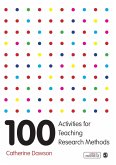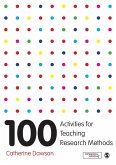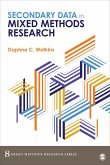This exciting collection is both useful and timely. It clearly lays out the problems, strategies and resources associated with the teaching of quantitative methods in modern universities.
Addressing the perceived 'crisis of number' in a practical and fresh way the book sets out dynamic new approaches to teaching quantitative methods. It offers historical, comparative, analytical reflection and empirical evidence concerning the crisis in contemporary social sciences.
Experts from across the social sciences provide a wide range of authoritative insights as well as a number of useful illustrations of strategies and resources designed to help overcome this 'crisis of number'. Each chapter reflects the diversity of backgrounds and approaches within the social sciences making this an interdisciplinary, relevant addition to the subject.
The book also:
ofocuses on innovations in how to teach quantitative research methods
oreports on the latest ESRC research projects on teaching quantitative methods
olocates itself within current debates about skills for employment.
Clear, engaging and original this book will be essential reading for those interested in learning and teaching quantitative methods.
Addressing the perceived 'crisis of number' in a practical and fresh way the book sets out dynamic new approaches to teaching quantitative methods. It offers historical, comparative, analytical reflection and empirical evidence concerning the crisis in contemporary social sciences.
Experts from across the social sciences provide a wide range of authoritative insights as well as a number of useful illustrations of strategies and resources designed to help overcome this 'crisis of number'. Each chapter reflects the diversity of backgrounds and approaches within the social sciences making this an interdisciplinary, relevant addition to the subject.
The book also:
ofocuses on innovations in how to teach quantitative research methods
oreports on the latest ESRC research projects on teaching quantitative methods
olocates itself within current debates about skills for employment.
Clear, engaging and original this book will be essential reading for those interested in learning and teaching quantitative methods.
This is a balanced plea for improving the way we teach social science methods and makes a compelling case for addressing the crisis in quantitative skills and reasoning in contemporary social science education. It does not seek to privilege quantitative social science but argues that the loss of quantitative competence is undermining the capacity to develop a mixed methods approach to social enquiry. I particularly value the emphasis on quantitative and systematic reasoning that are part and parcel of parcel of a quantitative approach. But this collection does more than make the case. It also provides evidence based approaches to improving the way we teach quantitative social science. This collection is timely and will equip those charged with the task of teaching quantitative methods to delive
David de Vaus
Faculty of Social & Behavioural Sciences, The University of Queensland
This book ought to be required reading, not only for those who teach quantitative methods, for whom it will be an invaluable resource, but for anyone concerned with the development of the undergraduate curriculum in university social science. Payne and Williams not only make an unanswerable case that current approaches to quantitative methods teaching are quite inadequate, they show clearly how it can, and must, be done better. They place a welcome emphasis on the 'basics'. The challenge is to ensure students have a solid command of the fundamentals of quantitative methods, so that they are not cut off from the vast and growing areas of social science knowledge that uses them. This book is not another instruction manual setting out what should be taught and how. It is much richer than that. It provides a lucid analysis, superbly well informed by the long experience of an impressive collection of practitioners, of what has gone wrong and how it can be put right. It is a book full of insight that teachers will want to consult again and again when thinking about how best to 'get the basics right
John Macinnes
Professor and Head of Sociology, University of Edinburgh and ESRC Strategic Advisor on undergraduate quantitative methods teaching
There is much talk and often hype nowadays about the crisis in quantitative research methods in British social science. It is time for a clear-thinking discussion of the underlying issues and how best to address them through teaching in this area. Payne and Williams's book represents a highly significant contribution to such a debate and should be essential reading for all of us who have taught quantitative research methods
Alan Bryman
Professor of Organisational and Social Research, University of Leicester
The volume at hand - Teaching Quantitative Methods; Getting the Basics Right, edited by Geoff Payne and Malcolm Williams - is a systematic and reflective answer to the so-called 'problem of numeracy' that is negatively affecting the global reach of British social sciences. The 11 chapters of the book, including the introduction written by the editors, are justified by the recognition of difficulties faced by British social science undergraduate programs to equip their students with adequate skills in quantitative research methods and hence discuss the significance of this context as well as solutions to it.
Adrian Hatos
Journal of Social Research and Policy
David de Vaus
Faculty of Social & Behavioural Sciences, The University of Queensland
This book ought to be required reading, not only for those who teach quantitative methods, for whom it will be an invaluable resource, but for anyone concerned with the development of the undergraduate curriculum in university social science. Payne and Williams not only make an unanswerable case that current approaches to quantitative methods teaching are quite inadequate, they show clearly how it can, and must, be done better. They place a welcome emphasis on the 'basics'. The challenge is to ensure students have a solid command of the fundamentals of quantitative methods, so that they are not cut off from the vast and growing areas of social science knowledge that uses them. This book is not another instruction manual setting out what should be taught and how. It is much richer than that. It provides a lucid analysis, superbly well informed by the long experience of an impressive collection of practitioners, of what has gone wrong and how it can be put right. It is a book full of insight that teachers will want to consult again and again when thinking about how best to 'get the basics right
John Macinnes
Professor and Head of Sociology, University of Edinburgh and ESRC Strategic Advisor on undergraduate quantitative methods teaching
There is much talk and often hype nowadays about the crisis in quantitative research methods in British social science. It is time for a clear-thinking discussion of the underlying issues and how best to address them through teaching in this area. Payne and Williams's book represents a highly significant contribution to such a debate and should be essential reading for all of us who have taught quantitative research methods
Alan Bryman
Professor of Organisational and Social Research, University of Leicester
The volume at hand - Teaching Quantitative Methods; Getting the Basics Right, edited by Geoff Payne and Malcolm Williams - is a systematic and reflective answer to the so-called 'problem of numeracy' that is negatively affecting the global reach of British social sciences. The 11 chapters of the book, including the introduction written by the editors, are justified by the recognition of difficulties faced by British social science undergraduate programs to equip their students with adequate skills in quantitative research methods and hence discuss the significance of this context as well as solutions to it.
Adrian Hatos
Journal of Social Research and Policy

